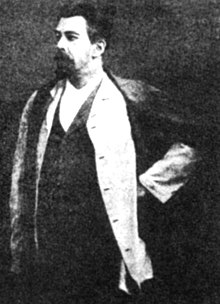Uncle Vanya
| Uncle Vanya | |
|---|---|

|
|
| Written by | Anton Chekhov |
| Original language | Russian |
| Setting | Garden of the Serebryakov family estate |
Uncle Vanya (Russian: Дядя Ваня, translit. Dyadya Vanya) is a play by the Russian playwright Anton Chekhov. It was first published in 1897 and received its Moscow première in 1899 in a production by the Moscow Art Theatre, under the direction of Konstantin Stanislavski.
The play portrays the visit of an elderly professor and his glamorous, much younger second wife, Yelena, to the rural estate that supports their urban lifestyle. Two friends—Vanya, brother of the professor's late first wife, who has long managed the estate, and Astrov, the local doctor—both fall under Yelena's spell, while bemoaning the of their provincial existence. Sonya, the professor's daughter by his first wife, who has worked with Vanya to keep the estate going, suffers from her unrequited feelings for Dr. Astrov. Matters are brought to a crisis when the professor announces his intention to sell the estate, Vanya and Sonya's home, with a view to investing the proceeds to achieve a higher income for himself and his wife.
Uncle Vanya is unique among Chekhov's major plays because it is essentially an extensive reworking of his own play published a decade earlier, The Wood Demon. By elucidating the specific changes Chekhov made during the revision process—these include reducing the cast-list from almost two dozen down to nine, changing the climactic suicide of the The Wood Demon into the famous failed homicide of Uncle Vanya, and altering the original happy ending into a more problematic, less final resolution—critics such as Donald Rayfield, Richard Gilman, and Eric Bentley have sought to chart the development of Chekhov's dramaturgical method through the 1890s.
Rayfield cites recent scholarship suggesting Chekhov revised The Wood Demon during his trip to the island of Sakhalin, a prison colony in Eastern Russia, in 1891.
...
Wikipedia
